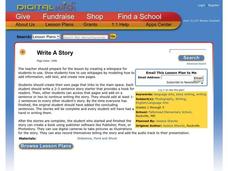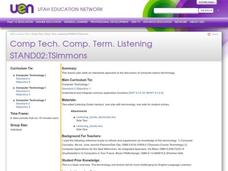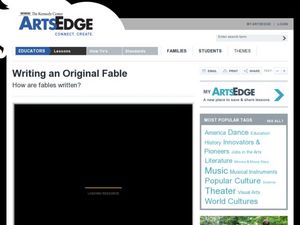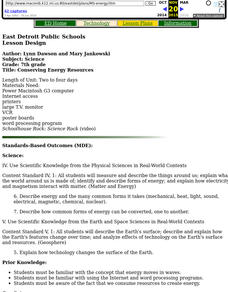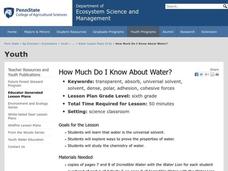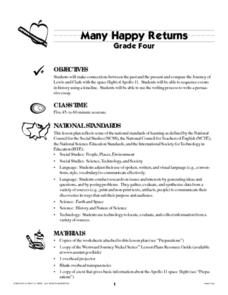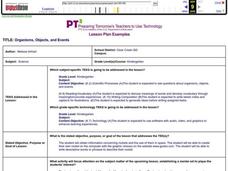Teach Engineering
Edible Rovers
The good thing about building this rover is you get to eat it afterwards. Pairs determine rover parts they want to include in their design based upon their cost and usefulness. The teams design their rovers, build them from edible...
Curated OER
Write a Story
Elementary writers will create short stories with their classmates' help, publishing the books using computer programs. The first learner writes a sentence to start the story, and each classmate adds a sentence to the story. The original...
Curated OER
Persuasive Paper: RFID
Students write a persuasive essay. In this persuasive writing lesson, students argue either for or against RFID technology. Students research RFID both as a class and individually, and follow paragraph-by-paragraph instructions to...
Curated OER
Computer Terminology
Students review the history of computer technology and how much it has changed over time. In groups, they examine the different looks of technology from the past to today and are introduced to computer terminology. Individually, they...
Curated OER
An Investigation into Effects of Rhizobium Soil Bacteria on Nitrogen Availability
Young scholars identify the control and the variables in the experiment. They describe the growth of plants with and without nitrogen fixing bacteria, then name the bacterium responsible for making nitrogen available to the plant.
Curated OER
Modeling the Big Bang and the Formation of the Universe
Sixth graders conduct an experiment to understand the Big Bang Theory. In this Big Bang Theory lesson plan, 6th graders will observe a balloon with confetti popping to emulate and analyze information related tot he Big Bang theory....
Curated OER
Rock and Their Properties: Days 2-4
Students engage in cooperative research projects in order to study about the properties of the three basic rock types and the processes that form them. They plan and develop their products.with the resources for conducting their...
Curated OER
Writing an Original Fable
Students discover how to write fables. In this writing skill lesson, students review the literary elements of fables and take all of the steps in the writing process to create their own fables.
Curated OER
Air Force Trains Warriors to Defend Cyberspace from Terror
Students explore the use of computers in the military. In this lesson, students read an article on plans the Air Force is making to increase their use of computers to fight terrorism, then participate in a discussion on the...
Curated OER
Behind the Mission To Mercury
Students assess the goals, benefits, success, and limitations of technology (instruments) on a space mission.
Curated OER
Time Travel, Black Holes, and Relativity
Students read the novel, The Time Machine, and compare H.G. Well's perceptions of the future with those presented in The Third Wave, by Alvin Toffler. They research current scientific and mathematical theories that relate to space and time.
Curated OER
Urban Changes
Young scholars explore how landscapes undergo constant changes with urban development. They plan and build their own "city" by including features that have minimal resource demands to sustain the city itself.
Curated OER
Conserving Energy Resources
Seventh graders research on energy conversion. After they have researched several types of energy resources, teams of two to four create posters which depict how these resources can be conserved.
Curated OER
Earthquake Epicenters and Magnitudes
Pupils work on a virtual earthquake to increase their understanding of seismograms, earthquake epicenters, Richter Magnitude and triangulation when finding the epicenter of an earthquake.
Curated OER
Moon WebQuest
Third graders research basic information about the moon and identify the phases and order of the phases of the moon. They conduct Internet research, complete a moon WebQuest, and write a magazine article about the moon using their...
Curated OER
How Much Do I Know About Water?
Sixth graders explore how water behaves on a penny. In this states of matter lesson, 6th graders observe water as they add drops to a penny. This lesson helps students apply the adhesive properties of water to the water cycle.
Curated OER
How Much Do I Know About Water?
Sixth graders explore ways to analyze the properties of water and examine the chemistry of water. In this water lesson students work in groups and complete several activities.
Curated OER
The Journey of Sacagawea
Students examine the life of Sacagawea, the exceptional woman chosen to appear on the Golden Dollar, and write journal entries based on their research.
Curated OER
Water: Friend and Foe
Young scholars brainstorm ways to prevent fires from home. In this technology lesson, students create fire-safety posters for their school. They research the internet and explore other resources to get information for the poster.
Curated OER
Many Happy Returns
Students compare the journey of Lewis and Clark with the space flight of Apollo 11. Students sequence events using a timeline. Students write a persuasive essay trying to persuade the people of the US to support space exploration.
Curated OER
Create a Story May
First graders review the terms characters, setting and events in stories. They are shown how to access the Kidspiration Map, and how to add pictures in the correct spaces on the map. Students insert pictures in the map of the story...
Curated OER
Organisms, Objects, and Events
Students obtain information concerning rockets and the use of them in space. They create their own rocket on the computer with the graphic choices on the website www.goobo.com. They write descriptive phrases about their rocket.
Curated OER
Volcanoes And Atmospheres
Students identify the volcano as the primary source of atmospheric gases, to explain the formation of ozone, and to recognize the dangers of volcanic gases through the use of technology in the classroom.
Curated OER
Comparing the Satellite and Broadcast Radio Landscapes
High schoolers research the development of satellite technology over the last 50 years students explain how the enactment of the Telecommunications Act of 1996 changed the rules for corporate ownership of multiple media outlets.

